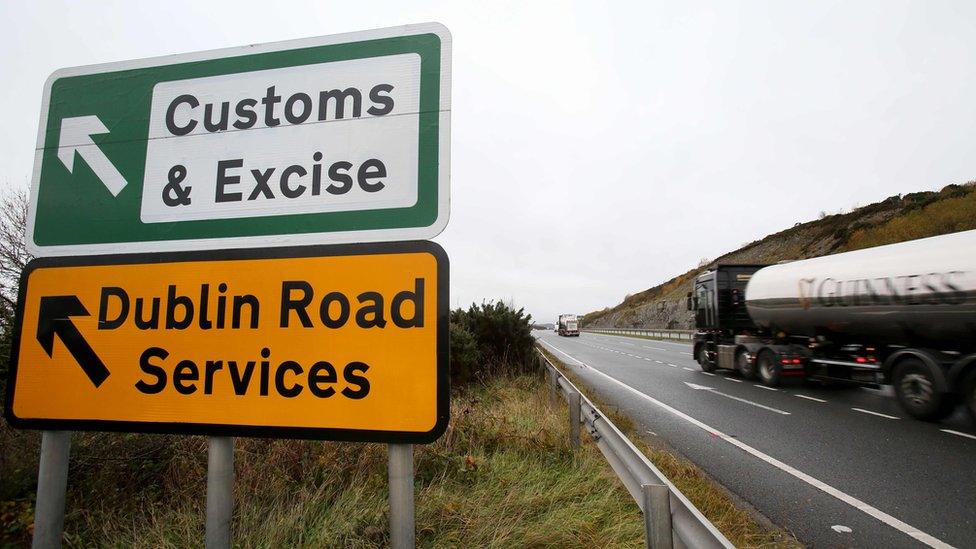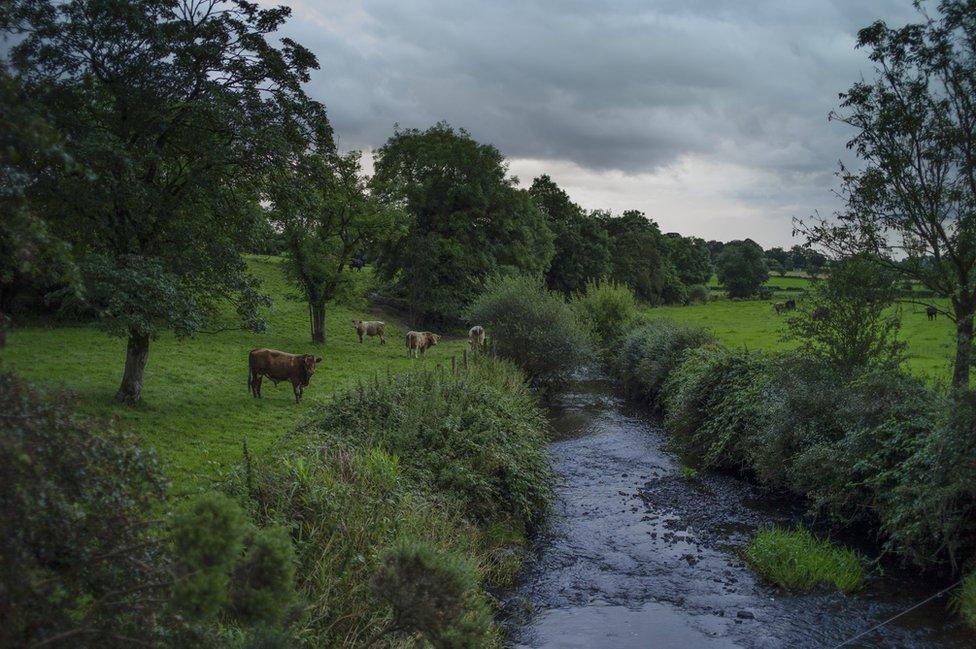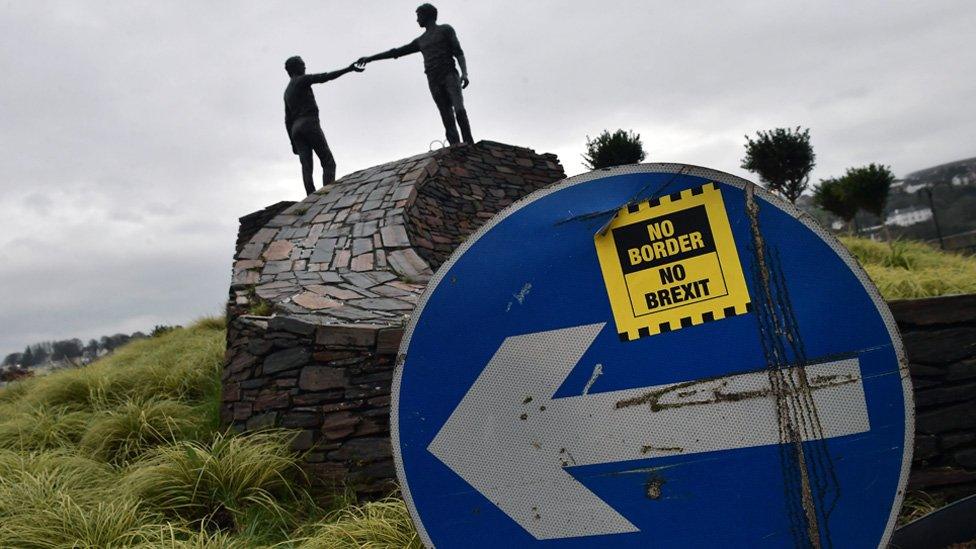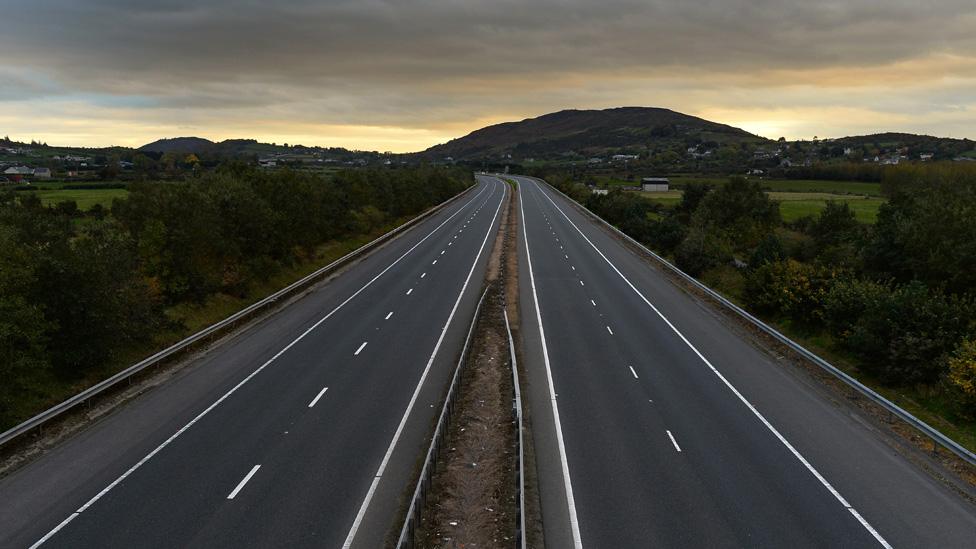Brexit: Boris Johnson open to all-Ireland food zone as backstop solution
- Published

Officials appear to have dismissed having mobile food standards checks away from the Irish border
The prime minister has suggested he is open to an all-Ireland food standards zone as part of a solution to replace the Brexit backstop.
Food standards are one of the most difficult border issues.
That is due to strict EU rules that say products from a non-member state must be checked at the point of entry.
If Northern Ireland was to align with the Republic of Ireland, it would effectively continue to follow EU rules.
That would mean that some food products coming from elsewhere in the UK would be subject to new checks and controls at Northern Ireland ports.
It came as Boris Johnson faced MPs in the Commons ahead of a showdown over Brexit.
In a blow to the prime minister, Tory rebels and opposition MPs defeated the government in the first stage of their attempt to pass a law designed to prevent a no-deal Brexit.
Mr Johnson has said he will visit Dublin on Monday to meet Taoiseach Leo Varadkar.
The prime minister said he wants to discuss the issue with the EU, and during the meeting with Mr Varadkar next week.

Analysis:
By John Campbell, BBC News NI economics and business editor
Would an all-island food standards zone be the backstop by another name?
Not quite.
The backstop would involve Northern Ireland following a range of single market rules beyond food and agriculture.
There's also the question of consent by unionist parties in Northern Ireland.
The prime minister said an all-island arrangement would have to "clearly enjoy the consent of all parties and institutions with an interest".
That suggests unionists would have to be convinced that the governance of such an arrangement would give them a greater say than have under the current backstop.
And remember, the backstop is only supposed to be temporary.
Would this food standards zone be intended as a permanent arrangement, just like the existing all-island animal health zone?

Mr Johnson said he recognises that "for reasons of geography and economics, agrifood is increasingly managed on a common basis across the island".
He told the Commons: "We are ready to find ways forward that recognises this reality, provided it clearly enjoys the consent of all parties and institutions with an interest."
That suggests any arrangement would need to have the support of the Democratic Unionist Party (DUP) and other unionists.
DUP deputy leader Nigel Dodds told BBC Newsline that the party would be "willing to sit down and look at what Boris is looking at and what can be done".
"We want to get a deal provided it's within the parameters of ensuring that it's not economically and constitutionally injurious to the union of Great Britain and Northern Ireland," he added.
Finding alternatives
The island of Ireland is already a single zone for animal health, which means all livestock coming into Northern Ireland from Great Britain is checked on entry.
If it was also to be a single zone for food standards, it would mean that some products coming from elsewhere in the UK would be subject to new checks and controls at Northern Ireland ports.
Earlier this week, a leaked government document suggested an all-Ireland food standards zone is being considered as part of a solution to replace the Brexit backstop.
The document states that alignment of standards between Northern Ireland and the Republic of Ireland is seen as "one of the most practical, deliverable and negotiable facilitations".

Livestock that enters Northern Ireland from Great Britain is checked on entry
However, it cautions that such an arrangement comes with many of the same political challenges as the backstop.
In relation to the document, a government spokesperson declined to comment.
"We have been clear that we stand ready to negotiate in good faith an alternative to the backstop, with provisions to ensure that the Irish border issues are dealt with where they should always have been, in the negotiations on the future agreement between the UK and the EU," the spokesperson said.
"We have likewise always said that these issues will require a package of measures addressing different customs and regulatory aspects, rather than just one single solution."
The backstop is a position of last resort to prevent the hardening of the Irish border in the absence of other solutions.
It would see Northern Ireland staying aligned to some rules of the EU single market and the whole of the UK forming a "temporary single customs territory" with the EU.
The prime minister has said the backstop cannot form part of any Brexit deal.
Meanwhile, DUP MP Sir Jeffrey Donaldson said there was now an inevitability about a general election in the coming weeks after Mr Johnson's government lost its working majority.
On Tuesday night, the Commons voted 328 to 301 to take control of the agenda, meaning they can bring forward a bill seeking to delay the UK's exit date.
In response, the prime minister said he would bring forward a motion for an early general election.
"If the general election is forced because of Brexit, then inevitably Brexit is going to be front and centre in the election," Sir Jeffrey said.
- Published22 August 2019

- Published9 September 2019

- Published16 October 2019
